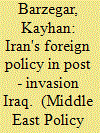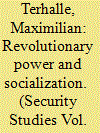| Srl | Item |
| 1 |
ID:
085543


|
|
|
| 2 |
ID:
128844


|
|
|
|
|
| Publication |
2014.
|
| Summary/Abstract |
Tehran's military capabilities do not match its ambitions for recognition and status. It is cautious, defensive and prudent in resorting to force, due as much to experience as to realism about its own limits. Iran has been a source of international concern for decades. Its general hostility to the international system disturbs the regional order. Tehran's initial aim of exporting the 1979 revolution, supplanted later by exporting its revolutionary model, has caused anxiety in smaller, traditional regimes. And the view that it is a belligerent state all too ready to resort to force feeds concern about its nuclear ambitions. This perspective, largely shared by Israel and some members of the Gulf Cooperation Council, is plausible but incomplete. I will argue that by orthodox standards Iran is militarily weak, and cautious, defensive and prudent in resorting to force. This is due as much to experience as to realism about its own limits. The country does not see itself as a military power or aspire to become one, even if some of its utterances and behaviour leave room for scepticism on this point.
|
|
|
|
|
|
|
|
|
|
|
|
|
|
|
|
| 3 |
ID:
091378


|
|
|
|
|
| Publication |
2009.
|
| Summary/Abstract |
Why do states stay revolutionary for so long? The question of why and how some political players of a country successfully pursue a revisionist strife against the status quo has neither theoretically nor empirically received systematic attention. I use a current policy issue, the crisis regarding Iran, as a single-case study to examine the issue. This article argues that answers are found in the interconnected realms of domestic politics and revolutionary ideas. In Iranian politics specifically, it is both the ideological conservative faction's occupation of key constitutional positions and pursuit of revolutionary ideas, which have caused the recurring and large degree of revolutionary zeal. In turn, this has had a significant effect on the extent of the Islamic Republic's socialization to regional and international politics
|
|
|
|
|
|
|
|
|
|
|
|
|
|
|
|